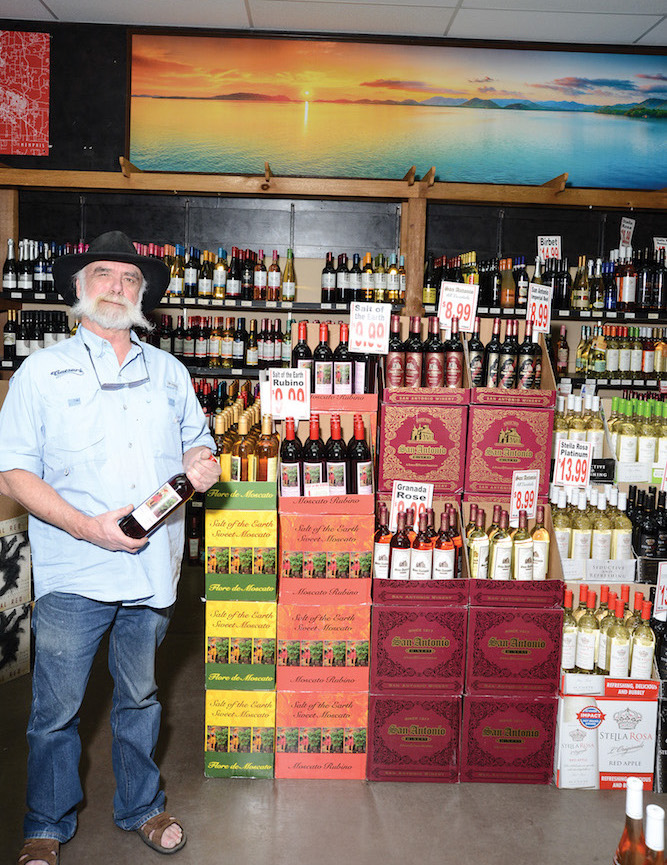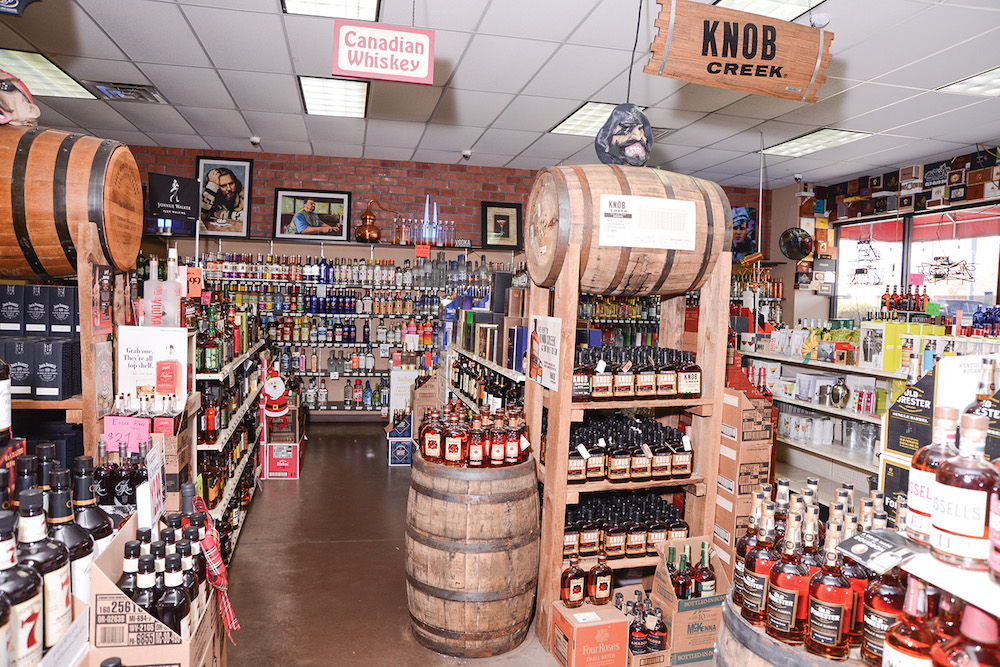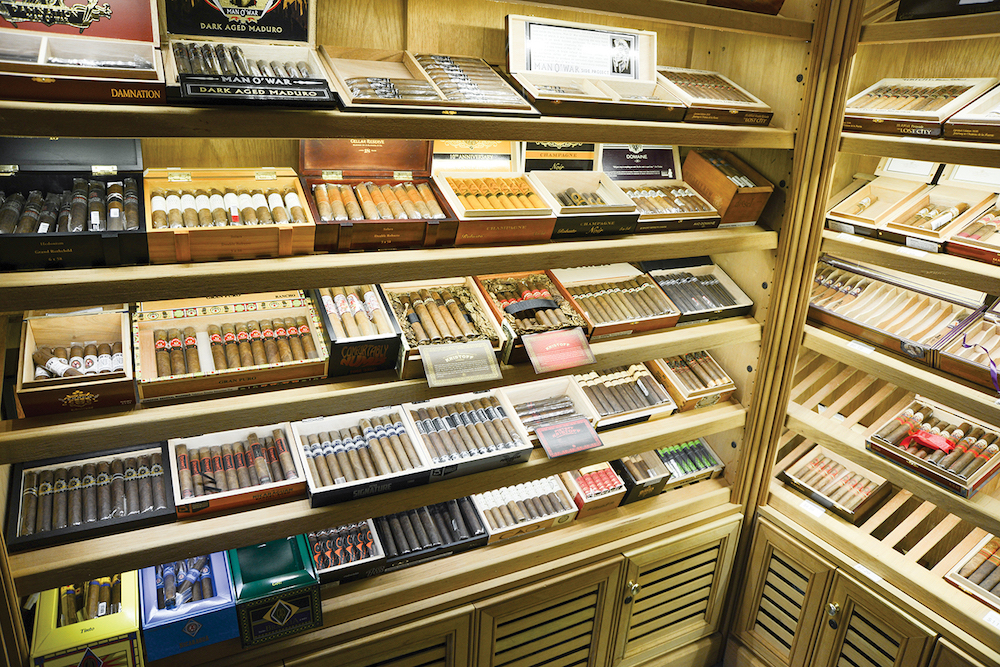Growth came fast for the Gordin family and their new venture. In 2013 they bought Caesar’s Wine & Liquor, an 8,000-square-foot shop in Arlington, TN, just outside of Memphis. In the five years since, business has increased by 42%.
“Whatever we’re doing here, it seems to be working,” says Gary Gordin, president of Caesar’s.
Today the store stocks 14,000 SKUs, including cigars, gourmet cheeses and chocolates, barware and a growler station. Changes in Tennessee law only recently allowed beverage alcohol retailers to carry some of those products, and the Gordins have taken advantage of this opportunity.
Caesar’s is a family business. Among the 12 employees are Gary’s children, who hold leadership roles. Together they have expanded the store’s offerings, while refocusing on more profitable categories and modern revenue centers. The results speak for themselves.
So how does a family enter an industry that’s new to them and immediately succeed? It helps to have an eye for opportunity, which begins at the top.
New Beginnings

Gary thought his career was over. After many successful years, including two decades as the CFO of a large manufacturing company, he found himself out of work following consolidation in 2009.
Retirement was not an option. Gary is a worker. He looked for a new job. For fifteen months he sought employment, but no luck. “I thought I was too old, and had made too much money, that I was never going to get another job,” he recalls.
One day, his wife Ramona told Gary there was a problem. “She said, ‘It’s 8 a.m. and you’re in my space’,” he remembers, laughing. “She said, ‘Go get a job.’”
So Gary bought a preschool. With this came more than 200 young children, plus their parents and the 35 members of the early-education staff. Interacting with all these adults, seeing the stresses of childcare and thinking of how people deal with stress, it dawned on Gary.
“What was missing from this equation was a liquor store,” he explains.
Gary was also attracted to the relative financial security of running a beverage-alcohol business. “In bad economic times people will drink cheaper whiskey, but they will still drink whiskey,” he says.
Which was how Gary and his family ended up purchasing Caesar’s Wine, Spirits & More, eleven years after it originally opened under different ownership in 2002.
“We realized very quickly that alcohol was an old-school business,” Gary says. “And when we didn’t know the rules, we just made them up.”
Growth Strategies
After the Gordins bought Caesar’s, they implemented changes. Among these was a restyling of the store’s atmosphere. They updated the décor and brightened the lighting, so that Caesar’s was more female-friendly and “looked less like a liquor store,” Gary explains.
Other aspects of the business they maintained. After all, the keys for growth remain “location, pricing, selection and customer service,” Gary says. “The basics. That’s really what it is.”
Before the Gordins purchased Caesar’s, the majority of store sales were spirits. That has not changed. “Focusing on spirits was a no-brainer,” Gary says. In 2013, the spirits/wine sales ratio was 58/42. Now it’s 65/35, partly because wine sales have slipped somewhat following a 2014 Tennessee law that allowed grocery stores to sell wine.
But Gary believes the wine losses at Caesar’s could have been worse.
A competing beverage alcohol retailer operates next to the nearby Kroger supermarket. Consumers seeking convenience were already walking to that grocery-adjacent store, rather than leaving the supermarket and driving two miles to Caesar’s. Thus the new wine section at Kroger is less damaging for Caesar’s than it is for the store next door.
“Because of our location we had never been a convenience business,” Gary explains.
Instead, his store differentiates through selection and prices. The cost of wine is cheaper at Caesar’s than at grocery stores because of bulk purchasing. A grocery store will buy a case of wine and mark it up 20% in price, which is still more expensive than the 40% markup Caesar’s adds when they buy 200 cases of that wine.
Lowering prices through bulk purchasing has been a major growth strategy for Caesar’s.
“Especially in spirits, the bigger deal you can buy, the cheaper you can lay it out for your consumer,” says Gary’s son Luke Gordin, co-owner. “We’re not the cheapest on everything, but we’re the cheapest on most. If you don’t get greedy, you can keep your customer base. That’s really the biggest thing, not running off your customers.”

New Laws Bring New Opportunities
A major shift in Tennessee beverage alcohol retail occurred in 2014. That year saw the passage of The Tennessee Wine in Grocery Store law. This multipart legislation greatly increased the variety of items that beverage alcohol retailers could legally sell (while also allowing grocery stores to carry wine).
The Gordin family saw opportunity. They added new products, expanding their stock beyond traditional beverage alcohol SKUs. This included items like wine corks, corkscrews and barware — now legal for retailers to carry. “A lot of people didn’t want to do that,” Gary says, “but we were able to add 10% in sales immediately.”
“Though of course that stuff is an add-on,” he continues. “You’re never going to make a lot of money there. We exist to sell wine and spirits and beer. But my thinking was that there were no barware stores around us. You’d have to go to Bed Bath & Beyond for that. So I thought, ‘Let’s sell that’.”
Another item that Tennessee alcohol retailers can now carry is tobacco products. Caeser’s added cigars. “The cigar business has been very nice to us,” Gary says.
Normally the markup on cigars in smoke shops is 100%. After some consideration, Caeser’s dropped that to 50%. This increased sales dramatically.
“We’re cheaper than anyone around here,” Gary says. “I guess you can buy cheaper online, but you can’t have those delivered to you the same day.”
With cigars, it’s an advantage that Caeser’s is not a devoted smoke shop. This is why they can afford the smaller markup. “A smoking store, the cigars is their entire business,” Gary says. “We just have a 10-by-12 humidor. It doesn’t cost me anything.”

The result is a new loyal customer base. “I’ve got customers who live 20 miles away who come in every couple of weeks to buy cigars, because we’re the cheapest out there,” says Gary’s son Josh Gordin.
“Even though we’re not trying very hard to compete for cigar customers, that discount alone adds one-or-more customers every couple of weeks,” Josh adds. “And they’ll usually pick up a bottle too, a nice whiskey to go along with that cigar.”
The new law also permits in-house tastings. Caesar’s built a full-size bar in the store, complete with back bar, so that they could keep products on hand to sample. These include a variety of wines and spirits, like handpicked single-barrel whiskey expressions that consumers are less likely to buy before tasting.
“Our wine, vodka and tequila sales went through the roof,” says Josh. “People who were only buying one or two bottles now buy one or two cases.”
This bar back is also where Caesar’s displays their ultra-premium products like Pappy Van Winkle, were all customers can see them.
Tennessee has also recently allowed alcohol delivery services. Caesar’s dabbled in this new business opportunity, but ultimately decided against it. Sending out staff for delivery runs represented a “huge liability,” Luke says. Especially with the challenge of ID laws when dropping off alcohol to private residences. And losing an employee for 30-40 minutes to deliver a couple of bottles of whiskey was not a profitable use of staff time.
So Caesar’s ended most of their delivery services. The business will still ship large orders, though, for functions such as weddings.
Premium Options

Like most retailers, Caesar’s bottom line is based largely on sales of 30-or-so must-have everyday items. Jack Daniel’s, Bacardi, Crown Royal, etc. But the shop has also expanded their premium offerings. Caesar’s boasts one of the best high-end selections around of rum and Scotch, Gary says. The store carries ten rums that cost more than $50 — and ten tequilas that top $200.
Caesar’s even stocks a 40-year-old bottle of Balvenie Scotch. It’s worth more than $5,000, which Gary admits might make this luxury item unsellable. But the Balvenie helps attract attention, building a reputation for Caesar’s.
For customers farther out from nearby Memphis — beyond the reach of the city’s Buster’s Liquors & Wines, “who is king here,” Gary says — Caesar’s has become a go-to destination for premium products.
While these items may not pay the bills like Jack Daniel’s and other staples, they have become an important part of the Caesar’s identity. “Rather than back away from the high-end, we’ve been supporting them, doubling down,” Gary says.
Caesar’s maintains a “cache” of higher-end wines. Rare vintages and brands like Opus One. Caesar’s will often have access to allocated bottles in wine and other categories because suppliers know that the store can move premium-priced items.
The profit margins on allocated bottles are “insane,” says Josh. And they attract related sales. “People will be calling for these bottles for months before, and there will also be foot traffic in the store as people see if we have them in yet,” Josh says. “And usually these customers will buy something while they’re here.”
Still, the bulk of wine and spirits sales remain in the $10-$20 range. “The high-end stuff is nice to have, because customers like to know that they can get it when they come in,” says Luke. “But the growth is in the major bulk items like Smirnoff and Tito’s.”
Beer in 2018
In 2015, the Gordins installed a 23-tap growler bar at Caesar’s. Gary did his due diligence before this investment. “I was wondering whether craft beer was a fad,” he recalls. “My logic was that if Budweiser was buying small craft breweries, and not paying small amounts for them, then I should follow their lead, because it means that craft beer is going somewhere.”
Where exactly remains to be seen these days, of course, as the craft beer industry experiences headwinds. The growler bar at Caesar’s now brings in 25% of the business as it once did. Still, that represents 5% of the store’s overall business. “I’m not ready to back out of it, because it still represents one more piece of the puzzle,” Gary says.
Craft beer has become somewhat of a touchy subject around Caesar’s. The store has room for more microbrewery SKUs, but concerns remain that the category is a fad losing steam. “How much longer do you ride it?” Luke asks. “Already it’s verging on too many microbreweries. Have consumers had enough?”
These are questions on many retailers’ minds. How much longer can the craft boom continue? Can existing consumer demand meet the exponentially growing amount of microbreweries? Or are we approaching a bubble burst?
In the meantime, Caesar’s has focused on local craft beer, both on the shelves and growler lines. Area brewers like Wiseacre, Memphis Made and High Cotton have loyal followings, which support sales.
Caesar’s will also take chances on craft producers from outside their region. “If it’s an out-of-state microbrewery, we’ll go through the supplier,” says Luke. “If it doesn’t sell, we won’t reorder. We’ll try everything, but only bring back what the customer wants.”
Working With Family
Caesar’s faces the same challenges and benefits as most family businesses. “Having your whole family involved, it’s difficult sometimes,” Gary says. “But it’s also very rewarding in the same sense.”
“You never expect to work with your children,” he adds, “and go in every day and see them, and then also on the weekends and holidays.”
The challenge remains separating family from work. Close bonds outside of the business can become obstacles in the office. “It’s hard to get onto your children critically, but you have to for the business,” Gary says. “They have their ideas, and I have my ideas. And when you add in grand-babies and in-laws, it does create friction.”
At the same time, Gary points out that one day his children will take over the store. Which is a large part of the reward. “I like to know that my family has a fine method to continue their luck in life with this business,” he says. “My sons and their families have a profitable path forward in the future.”
Kyle Swartz is editor of Beverage Wholesaler. Reach him at kswartz@epgmediallc.com or on Twitter @kswartzz or Instagram @cheers_magazine. Read his recent piece 3 Emerging American Whiskey Brands.









